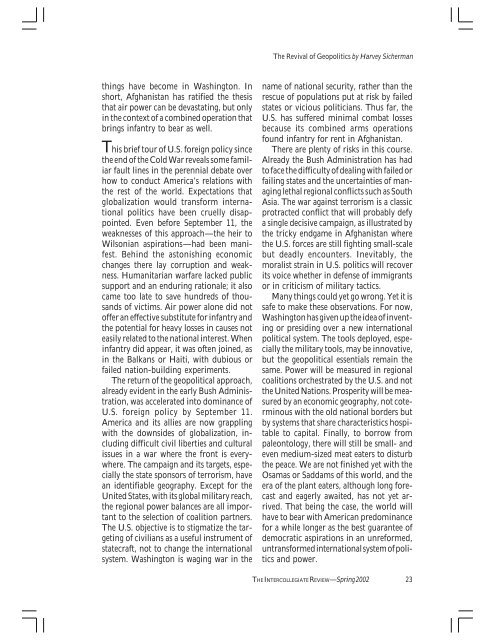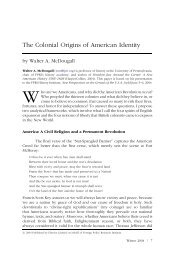The Revival of Geopolitics - Foreign Policy Research Institute
The Revival of Geopolitics - Foreign Policy Research Institute
The Revival of Geopolitics - Foreign Policy Research Institute
Create successful ePaper yourself
Turn your PDF publications into a flip-book with our unique Google optimized e-Paper software.
things have become in Washington. In<br />
short, Afghanistan has ratified the thesis<br />
that air power can be devastating, but only<br />
in the context <strong>of</strong> a combined operation that<br />
brings infantry to bear as well.<br />
This brief tour <strong>of</strong> U.S. foreign policy since<br />
the end <strong>of</strong> the Cold War reveals some familiar<br />
fault lines in the perennial debate over<br />
how to conduct America’s relations with<br />
the rest <strong>of</strong> the world. Expectations that<br />
globalization would transform international<br />
politics have been cruelly disappointed.<br />
Even before September 11, the<br />
weaknesses <strong>of</strong> this approach—the heir to<br />
Wilsonian aspirations—had been manifest.<br />
Behind the astonishing economic<br />
changes there lay corruption and weakness.<br />
Humanitarian warfare lacked public<br />
support and an enduring rationale; it also<br />
came too late to save hundreds <strong>of</strong> thousands<br />
<strong>of</strong> victims. Air power alone did not<br />
<strong>of</strong>fer an effective substitute for infantry and<br />
the potential for heavy losses in causes not<br />
easily related to the national interest. When<br />
infantry did appear, it was <strong>of</strong>ten joined, as<br />
in the Balkans or Haiti, with dubious or<br />
failed nation-building experiments.<br />
<strong>The</strong> return <strong>of</strong> the geopolitical approach,<br />
already evident in the early Bush Administration,<br />
was accelerated into dominance <strong>of</strong><br />
U.S. foreign policy by September 11.<br />
America and its allies are now grappling<br />
with the downsides <strong>of</strong> globalization, including<br />
difficult civil liberties and cultural<br />
issues in a war where the front is everywhere.<br />
<strong>The</strong> campaign and its targets, especially<br />
the state sponsors <strong>of</strong> terrorism, have<br />
an identifiable geography. Except for the<br />
United States, with its global military reach,<br />
the regional power balances are all important<br />
to the selection <strong>of</strong> coalition partners.<br />
<strong>The</strong> U.S. objective is to stigmatize the targeting<br />
<strong>of</strong> civilians as a useful instrument <strong>of</strong><br />
statecraft, not to change the international<br />
system. Washington is waging war in the<br />
<strong>The</strong> <strong>Revival</strong> <strong>of</strong> <strong>Geopolitics</strong> by Harvey Sicherman<br />
name <strong>of</strong> national security, rather than the<br />
rescue <strong>of</strong> populations put at risk by failed<br />
states or vicious politicians. Thus far, the<br />
U.S. has suffered minimal combat losses<br />
because its combined arms operations<br />
found infantry for rent in Afghanistan.<br />
<strong>The</strong>re are plenty <strong>of</strong> risks in this course.<br />
Already the Bush Administration has had<br />
to face the difficulty <strong>of</strong> dealing with failed or<br />
failing states and the uncertainties <strong>of</strong> managing<br />
lethal regional conflicts such as South<br />
Asia. <strong>The</strong> war against terrorism is a classic<br />
protracted conflict that will probably defy<br />
a single decisive campaign, as illustrated by<br />
the tricky endgame in Afghanistan where<br />
the U.S. forces are still fighting small-scale<br />
but deadly encounters. Inevitably, the<br />
moralist strain in U.S. politics will recover<br />
its voice whether in defense <strong>of</strong> immigrants<br />
or in criticism <strong>of</strong> military tactics.<br />
Many things could yet go wrong. Yet it is<br />
safe to make these observations. For now,<br />
Washington has given up the idea <strong>of</strong> inventing<br />
or presiding over a new international<br />
political system. <strong>The</strong> tools deployed, especially<br />
the military tools, may be innovative,<br />
but the geopolitical essentials remain the<br />
same. Power will be measured in regional<br />
coalitions orchestrated by the U.S. and not<br />
the United Nations. Prosperity will be measured<br />
by an economic geography, not coterminous<br />
with the old national borders but<br />
by systems that share characteristics hospitable<br />
to capital. Finally, to borrow from<br />
paleontology, there will still be small- and<br />
even medium-sized meat eaters to disturb<br />
the peace. We are not finished yet with the<br />
Osamas or Saddams <strong>of</strong> this world, and the<br />
era <strong>of</strong> the plant eaters, although long forecast<br />
and eagerly awaited, has not yet arrived.<br />
That being the case, the world will<br />
have to bear with American predominance<br />
for a while longer as the best guarantee <strong>of</strong><br />
democratic aspirations in an unreformed,<br />
untransformed international system <strong>of</strong> politics<br />
and power.<br />
THE INTERCOLLEGIATE REVIEW—Spring 2002 23



